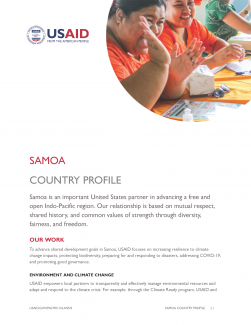Samoa

Country Profile
Samoa is an important United States partner in advancing a free and open Indo-Pacific region. Our relationship is based on mutual respect, shared history, and common values of strength through diversity, fairness, and freedom.
OUR WORK
To advance shared development goals in Samoa, USAID focuses on increasing resilience to climate change impacts, protecting biodiversity, preparing for and responding to disasters, addressing COVID-19, and promoting good governance.
ENVIRONMENT AND CLIMATE CHANGE
USAID empowers local partners to transparently and effectively manage environmental resources and adapt and respond to the climate crisis. For example, through the Climate Ready program, USAID and the United Nations Development Programme supported the Samoan Ministry of Natural Resources and Environment to develop a land use management and biodiversity project that mobilized $22.4 million from the Global Environment Facility. The project will protect Samoa's natural resources by empowering local communities to safeguard Samoa’s indigenous species, natural ecosystems, and food production systems from invasive alien species and unsustainable land use practices. This project will improve livelihoods and protect globally significant biodiversity, and directly benefit over 25,000 people across 60 villages in Samoa. Climate Ready also supported the Samoa Ministry of Works, Transport, and Infrastructure to incorporate resilience building into their Infrastructure Asset Management Strategy. The strategy is now approved and is awaiting government endorsement. USAID also partners with the U.S. Peace Corps to raise environmental awareness among remote communities and increase their resilience to climate change by funding small grants to community organizations initiated by Peace Corps volunteers.
DISASTER PREPAREDNESS AND RESPONSE
Similar to other Pacific Island nations, Samoa is highly vulnerable to recurring extreme weather events and natural hazards—such as storms, floods, earthquakes and tsunamis—that can result in casualties, displacement, and other humanitarian impacts, and due to climate change, hydrometeorological disasters are increasing in frequency and intensity. USAID’s Bureau for Humanitarian Assistance (BHA) partners with United Nations agencies and non-governmental organizations (NGOs) to bolster disaster risk reduction (DRR) and resilience throughout the Pacific Islands. For example, in Samoa, USAID/BHA is partnering with Catholic Relief Services to establish three warehouses and preposition emergency relief supplies at six locations throughout the country. This effort will strengthen disaster preparedness for vulnerable populations.
USAID/BHA also partners with CARE to provide agricultural assistance and disability- and gender-inclusive community-based DRR activities throughout Samoa, Kiribati, Tonga, and Tuvalu. USAID/BHA has supported the U.S. National Oceanic and Atmospheric Administration since 2009 to deploy chatty beetles—satellite terminals that facilitate text messaging in remote areas with limited connectivity—to disseminate hydrometeorological alerts and other important information. The messaging system–which proved to be critical during the Hunga Tonga–Hunga Haʻapai volcanic eruption in neighboring Tonga–connects emergency response authorities with remote communities in Pacific Island nations, including Samoa.
DEMOCRACY AND GOVERNANCE
USAID reinforces the foundations of good governance in Samoa by encouraging all citizens — including women, youth and other marginalized groups — to participate in democratic processes. USAID promotes government accountability and transparency by encouraging citizen engagement and effective policy implementation. For example, USAID strengthened the Ombudsman of Samoa, which also functions as the country’s human rights commission, to conduct a forum which enabled youth to advocate for child rights at the international level through the submission of formal reports to the Committee on the Rights of the Child. USAID trained Samoa’s Human Rights Institution on information management, helping this important good governance institution to operate more effectively. USAID also improved Samoan students’ advocacy skills by supporting a strategic communication workshop and a workshop about empowering disability inclusion and access in the media.
CROSS-CUTTING
USAID partners with civil society organizations to support multi-sectoral grants that strengthen communities’ resilience to disasters and climate risks, livelihoods, food security, access to water, improved health and education, governance, natural resources management, and biodiversity conservation. For example, through the Pacific American Fund, USAID is partnering with the Adventist Development and Relief Agency to promote women’s empowerment and address disaster risk management needs for 14,000 people in 20 rural Samoan villages; and with the Women in Business Development, Inc. to work with 2,000 households throughout Samoa to protect small coconut tree farms by managing the population of Coconut Rhinoceros Beetles with biological methods instead of chemicals and pesticides.


